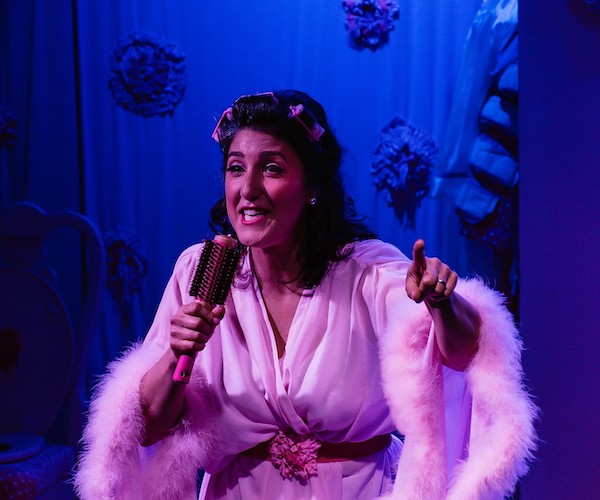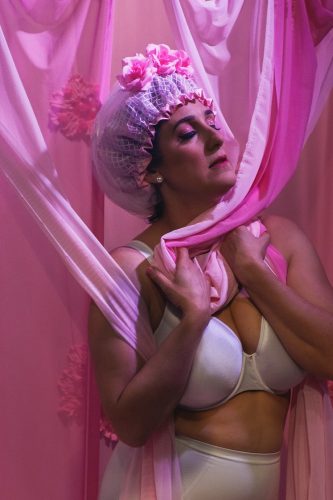Dance Feature: Sara Juli’s “Burnt-Out Wife” — Scorched
By Debra Cash
In Burnt-Out Wife, Maine-based performance artist Sara Juli takes on the unarticulated rage lurking in a long-term marriage with a deft touch and the humor of a born stand-up comic.
Sara Juli’s Burnt-Out Wife, created and performed by Sara Juli with dramaturgy by Michelle Mola, set design by Pamela Moulton, costumes by Carol Farrell, sound design by Ryan MacDonald, and lighting design by Justin Moriarty. Commissioned by American Dance Festival, streaming August 11-17. For mature audiences only. Tickets include access to Zoom talk back with Sara Juli, Chris Ajemian, and ADF director Jodee Nimerichter on August 16 at 7 p.m.

A scene from Sara Juli’s Burnt-Out Wife. Photo: Nick Pierce
Back in nascent second-wave feminist days, writer Betty Friedan described a problem that she said had no name. It was a restlessness made of boredom and disrespect that was driving presumably happy female homemakers — the privileged white women of the shiny new post-WWII American suburbs — to depression, to drink, and worse.
The receding horizon of personal fulfillment for women comes in different varieties depending on the era, but structural social problems continue to play out in women’s inner lives. Scratch a female who looks like she is having it all – even Michelle Obama — and you will find someone who confesses to be depressed, or even at the end of her rope. The Covid-19 pandemic has only made those challenges more visible and if we’re lucky — and get out and protect the vote — naming persistent problems may turn into steps towards action. (If you know any families – especially moms — trying to make decisions about the upcoming school year, do something nice for them right now. And if you are one of those moms, this writer sends you a big “attagirl” and a serving of virtual milk and cookies.)

A scene from Sara Juli’s Burnt-Out Wife. Photo: Nick Pierce.
In a pre-pandemic world, Maine-based performance artist Sara Juli took on the unarticulated rage lurking in a long-term marriage with a deft touch and the humor of a born stand-up comic. The one woman show, Burnt-Out Wife, is set in “a “Pepto Bismol pink bathroom” complete with curtained shower, commode, and slipper tub. It was scheduled for a national tour that had been two years in the making. When the country shut down, that disintegrated and left the artist with no income to speak of for the foreseeable future.
Fortunately, the show’s in-progress performances at SPACE in Portland were taped, and with some new material and editing will be streamed for a week under the auspices of the American Dance Festival. (Try to watch on a screen larger than a laptop to emulate the show’s immersive effects.) Even though Sara was reticent to put the work online — she says that the practices of “fostering magic” that she learned from avant-garde dancemaker Deborah Hay to create intimacy in live performance are important to her — she was glad that the work might be able to find an audience while we are unable to gather.
We have been galvanized at this moment by urgent, existential issues: a global virus, challenges to racial injustice and calls for an end to white supremacy, corruption in government and a slide towards fascism, and the prospects for the very sustainability of the planet. Nevertheless, the ambivalences and struggles between partners of any gender will continue to play out. “Now is the time to elevate marginalized voices to step aside and make space for others,” Sara believes, but after some internal conflict and long discussions with ADF management, she determined that “this work is about making space for marginalized female voices, for women, or women-identified people who are struggling in their long-term partnership or marriages. That doesn’t mean squashing other voices and other inequities,” she told me. “It’s an ‘and’ statement, not an ‘or’ statement.” Naming personal struggles will continue to matter in whatever new normal we find ourselves living through in the years ahead.
Sara and I are colleagues. We worked together at the Bates Dance Festival (I was Scholar in Residence, she taught an essential class on the Business of Dance, based on her own consulting practice and performed there with Claire Porter in The Lectern ). She has been a conduit between Boston Dance Alliance, where I serve as Executive Director, and the dance community in southern Maine. When she brings her students to Boston for an arts administration field trip, I’m one of the lecturers she invites to talk to them. She has also been helpful to The Arts Fuse as we have developed our nonprofit practices.
We checked in by Zoom ahead of the ADF screenings while she was staying at home with her family — her husband, her two school age daughters, and their new “pandemic puppy,” Brooklyn. I asked how she was doing, and whether she is more — or less — burnt out these days. And I asked her if her work could be seen as a single unspooling act of storytelling, a kind of performance art autobiographical miniseries.
The answer was yes. “I am patiently waiting for menopause,” she joked, “so I will have a trifecta of motherhood, marriage, and menopause. Part of my mission as an artist is that I am marking personal moments over time. Tense Vagina dealt with having children and early motherhood. That phase of my life ended and you have a moment to breathe when the children are not hanging from your breast anymore and oh wait a minute, my marriage is not where I want it to be. If you were to look back at my repertoire in my 20s, I made this work called How to Forgive Yourself in Bed, which was about promiscuity so now I’m in monogamy hell.
“I would like to not get a divorce and the piece is part of working on it. It’s getting it all out there but I also want to connect with other people in different spaces of marriages or long-term relationships who might be on the precipice. That’s how I tend to choose my topics – I come to a breaking point and I say ‘I’ve got to make a dance!’ And then I’m able to move forward.”
Sara Juli’s Burnt-Out Wife Promo from Sara Juli on Vimeo.
“I call these my healing dances for a reason, and there is a catharsis in performing. The pieces become very antiquated quickly when I work with such live material. So much of our marriage has changed during the pandemic, spending so much time together. If I were to have an opportunity to perform again it would either have to be as-is, as acting or updated to reflect my new state of mind.”
The talk back on August 16 will include her husband, Chris Ajemian.
“I didn’t want to make a piece that was at all attacking my partner. That would not help the cause to really show underlying pain. This is not necessarily at all about him as a human but to rather look at the construct of marriage and the social norms around it.”
“I wanted the piece to be a bigger picture about this character, this person you are seeing, it happens to be an extended version of myself but it gives a little more freedom to play. Using my marriage as the portal to make a larger comment in a very pink way!”
“Seventeen years in, it’s to say, look, this is hard, and open up some dialogue about it. Having his voice present at the talk back says this is hard work if you want a healthy partnership, whether you are married or not.”
“If you watch too many romantic comedies, like I do, you get this whole sense of the ridiculousness. The point is that I’m willing to work hard.”
“I knew I was doing my job when I had several people contact me after they’d seen the show and say ‘you know on our drive home we had a really good talk.’”
Debra Cash, a founding contributor to the Arts Fuse now serving on its Board, is Executive Director of Boston Dance Alliance.

Very well done, Debra. and Sara. Brava.